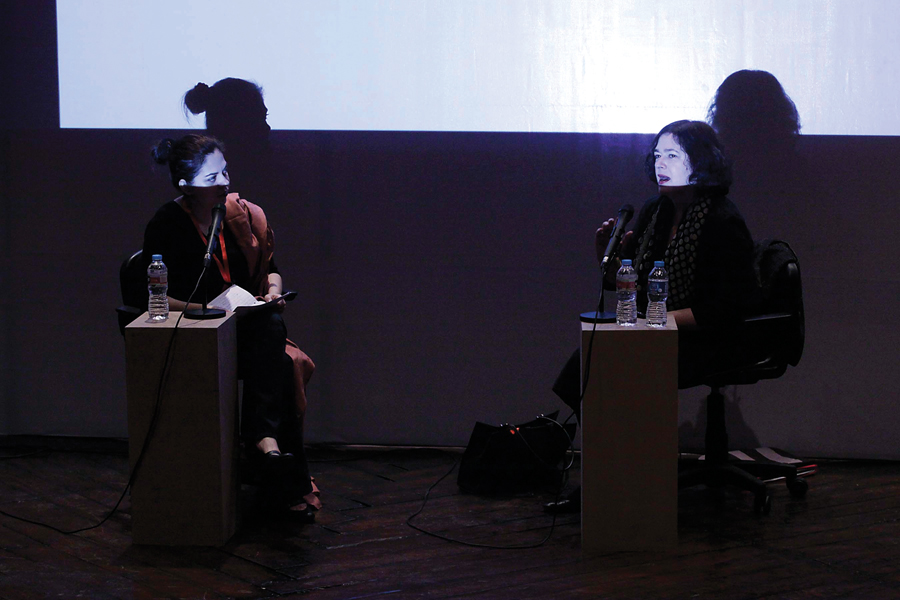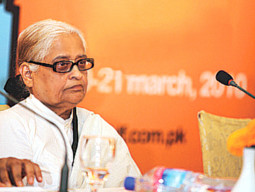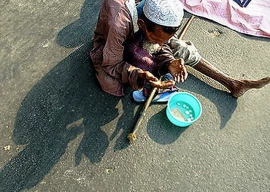
LAHORE:
“Hindi film is predicting its demise since the beginning. Every year producers who have had failures tout that the industry is finished due to television, dvds, changing technology and that there is a need to modernise. And then a Dabangg comes along. Films have to keep changing otherwise people will get bored,” said Rachel Dwyer, Professor of Indian Cultures and Cinema at The School Of Oriental and African Studies. India, Dwyer added, was the only country that preferred its own cinema and where different kinds of movies are produced to keep a diverse population happy and engaged.
Dwyer was speaking to a packed hall (the crowd spilled out to the stairs) with Mira Hashmi on The Rise and Fall of the Masala Film at the Lahore Literary Festival on Sunday.
Dwyer started off the proceedings with an entertaining slide show to eek out a definition of a masala film - star, song and dance, family, action, comedy, melodrama and some magic, she said, were the ingredients. She said that some placed the beginning of masala films from 1995 onwards, the year Hindi cinema supposedly went global. She does not agree with that time frame. She pointed out that even films that tried to challenge the dominant Bollywood film dipped into the masala mix. Dwyer pointed to Anurag Kashyap’s Gangs of Wasseypur as an example of a ‘hatke’ film that still played with some masala ingredients.
Masala films, as far as Dwyer is concerned, have never fallen. The mix has just changed.
Dwyer tossed aside any notion that that Hindi films are formulaic with happy endings. “So Hindi films have formulas while Hollywood has genres,” she asked. She pointed to Mother India, Mughale Azam, Deewar and Sholay as films that had not provided the audience with a neat and happy ending.
“Fantasy, desire and escapism are essential ingredients. The Hollywood films Gravity is not realistic. People don’t want that.”
Responding to Hashmi’s inquiry regarding the absence of rural settings in recent Bollywood films, Dwyer said that Bollywood film was a more urban form and people no longer connected to ‘the village’ anymore. “The village was never really the village.” She mentioned that critics of Dabangg had said that the town it was set in was an urbanites version.
Dwyer said there had been a comeback of realist cinema in recent years. “Regional films might be set in villages dealing with real issues like a drought.”
Speaking about Amitabh Bachchan’s popularity, Dwyer pointed out that in an early role he had been cast as a mute. “He was too tall, too dark. But Amitabh has a way of emotionally connecting with his audience.” She added that Bachchan had picked up the anger of the overlooked person and his backstory (an elite family from Allahabad, the near death experience on the sets of Coolie, the tumultuous affair with Rekha, his comeback in the 90s) added to his persona. “He has now found a new voice as the patriarch. He is an icon of India – global and authentic.” Prodded by Hashmi to speak about her favourite actor Rishi Kapoor, Dwyer marveled at how the Kapoors, Dilip Kumar and Shahrukh Khan had all come from the same street in Peshawar. She said Rishi Kapoor had lived under the double shadow of his father, Raj Kapoor, and Amitabh Bachchan. “Rishi offered an alternative model of masculinity. You did not realise what a talented actor he is. With his knitted sweaters, he had that cuddly boy-next-door look.” She said with Ranbir Kapoor, the Kapoor dynasty was phenomenal at producing top notch marquee stars.
Dwyer said that stardom could also be constraining. “Shahrukh Khan can act. But in India, people want to see superstar Shahrukh.” Dwyer said her hypothesis about Shahrukh slowing down and changing pace as he approaches 50 was shattered when Chennai Express was released.
Dwyer ended the session by pointing out that work needed to be done on how integral the Lahore studios were in producing stars that influenced Bollywood and that maybe we would have a very different Bollywood if the Lahore studios did not exist.
Published in The Express Tribune, February 24th, 2014.
COMMENTS (13)
Comments are moderated and generally will be posted if they are on-topic and not abusive.
For more information, please see our Comments FAQ




























































Why we end up fighting like this, even on non issues? Our cultures are the same. Not much difference between Lahore and Lucknow. Believe me
@Arjun:
True bro, India just does not have an unbiased newspaper website where people from across the border can vent out their frustration, I agree with you.
@Indian: My friend , kindly watch some of the Pakistani dramas before opening your mouth about the state of media in Pakistan. Unlike India, Pakistani media is independent and we do not have saas-bahu sagas with heavily made up ladies roaming around the house conspiring against each other. Next time, do some research before venting out frustration on a Pakistani newspaper website. Have a nice day :)
Somebody answer me. How can two nations of a region that have been one nation (albeit federated) for over a 1000 years be expected to have different identities within the space of 70 years? As much as Pakistan wants to see itself as an Arab nation, the fact remains that it cannot shake off its Indian roots for another 1000 years. The authorities can try showing Turkish and Arabic soap at primetime to make this change happen but cultural ties are very resilient - even more so than religious ties.
Pakistan ka sab kuchh arabon se hi to liya hua hai. India ka jo bhi ho jaisa bhi ho, apna khud ka hai.
According to me what separates Pakistan from India is only the religion. Other wise Pakistan is a mini India indeed. With may be 4 ethnicities and half a dozen languages. India is a scaled up version.. with nearly 4 dozen ethnic and sub ethnic groups and a hundred plus languages. Yes religion has narrowed the thinking power of our neighbours. Pity them.....
We are so much obsessed with Indian Culture...If we have that much in common (which I don't think it is not), pro-indian parties/media should start campaign to re-join with India...